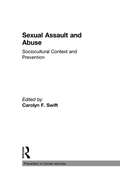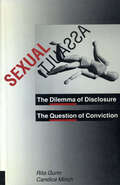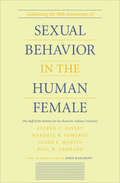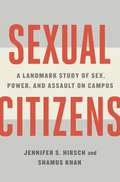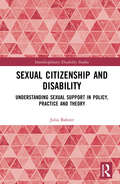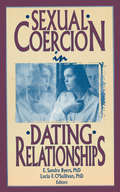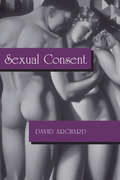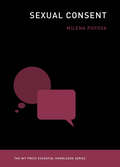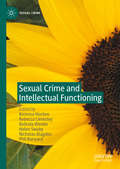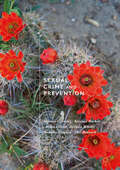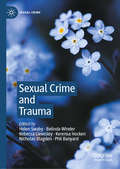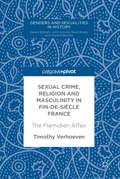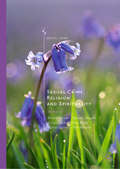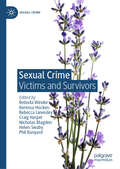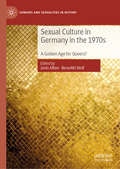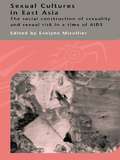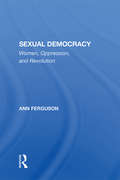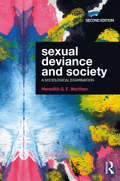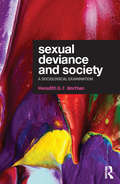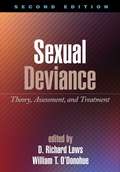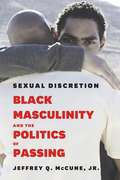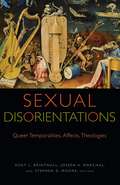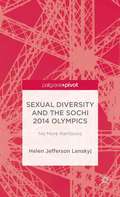- Table View
- List View
Sexual Assault and Abuse: Sociocultural Context of Prevention
by Robert E Hess Carolyn F SwiftPrevention of a chronic societal problem such as sexual victimization requires looking beyond individuals to the systemic factors that maintain the problem. Sexual Assault and Abuse addresses the need to change social and cultural beliefs and practices that permit the sexual victimization of women and children. Potential rapists and victims are viewed within the context of the social and cultural factors that shape sexual behavior. The book discusses rape prevention approaches ranging from changing individuals and groups to changing the social and cultural factors that permit and promote sexual victimization.Research in the social sciences, in education, and in the media documents the promise as well as the problems with efforts to change social and cultural beliefs and practices to create a sexually safe society. Sexual Assault and Abuse integrates recent advances in research on sexual assault and prevention into strategies to prevent sexual victimization, with a focus on the role of sociocultural factors.In Sexual Assault and Abuse, editor Carolyn F. Swift brings together authors who thoughtfully examine the perpetrators and victims of sexual assault/abuse in an effort to change or obliterate sociocultural factors which maintain or promote this behavior. Topics covered include: the sociocultural context of sexual assault/abuse the need to develop multiple-level prevention programs development of sexually abusive behavior in men and boys the relationship between pornography and sexual assault/abuse the need for culturally-sensitive prevention programs the significance of sexual revictimization in the lives of African American women an ecological approach to the prevention of sexual harassment utilization of social science research to develop public policy on pornography use of public information campaigns to prevent intrafamilial child sexual abuse within Hispanic familiesSexual Assault and Abuse identifies sociocultural risks associated with sexual assault/abuse and explores ways to reduce these risks, from a prevention perspective, for diverse populations. Risks addressed include gender inequities, pornography, worksites hostile to women, previous victimization in African American females, sexist and racist beliefs, and media violence against women. Prevention programs range from interventions to stop the development of sexually abusive behavior in boys and men, through programs that take account of ethnic diversity in language, history, and culture, to those that promote empowerment of women. By addressing the environmental context in which sexual assault occurs, the authors in Sexual Assault and Abuse broaden their focus to incorporate both potential perpetrators and potential victims in an ecological perspective which permits new approaches to prevention. This book is of special interest and value to academics and practitioners of psychology, psychiatry, and social work, therapists and counselors, women&’s studies professionals, sociologists, anthropologists, feminists, rape crisis center staff and volunteers, and battered women center staff and volunteers.
Sexual Assault and Sexual Harassment in the U.S. Military
by Andrew R. Morral Terry L. Schell Kristie L. GoreThe Department of Defense Sexual Assault Prevention and Response Office asked the RAND Corporation to independently assess rates of sexual assault, sexual harassment, and gender discrimination in the military. This volume presents the results of methodological investigations into sources of potential bias in estimates produced from the 2014 RAND Military Workplace Study for active- and reserve-component members in the U.S. military.
Sexual Assault and Sexual Harassment in the U.S. Military: Volume 5. Estimates for Installation- and Command-Level Risk of Sexual Assault and Sexual Harassment from the 2014 RAND Military Workplace Study
by Andrew Gelman Andrew R. Morral Terry L. Schell Jessica Hwang Matthew CefaluThe Department of Defense Sexual Assault Prevention and Response Office asked the RAND Corporation to conduct an assessment of the rates of sexual assault, sexual harassment, and gender discrimination in the U.S. military. This volume presents survey estimates of how risk of sexual assault and sexual harassment varies across military installations and major commands using data from the 2014 RAND Military Workplace Study.
Sexual Assault: The Dilemma of Disclosure, The Question of Conviction
by Rita F. Gunn Candice MinchOnly a small percentage of all cases of sexual assault are reported to the police. Why do so many women decide not to report an assault? And what happens to the assailant when a case is reported and charges are laid? In this volume Rita Gunn and Candice Minch explore the answers to these questions, basing their analysis on the most comprehensive data available on sexual assault in Canada. Through interviews with victims of sexual assault, they analyze the factors that influence the women to report an attack or keep silent. Society still places the responsibility on women to avoid being sexually assaulted, so the victim is caught in a dilemma when deciding whether to disclose an assault. The authors then look at what happens when a sexual assault is reported. They follow a sample of assaults from the initial police report through to the final disposition of the case, demonstrating that: only 10 percent of the original charges resulted in conviction; 20 percent were reduced to lesser charges; over 70 percent of the charges were filtered out of the criminal justice system before trial; and societal attitudes which blame victims for the offence extend into the legal system. Finally, the authors offer an assessment of the effects of the 1983 sexual assault legislation on the processing and ultimately on the reporting of sexual offences. They conclude that law reform is necessary but not sufficient in itself. “The law is only as innovative as the individuals who use, interpret, and apply it.” This volume provides a valuable analysis of sexual assault as it affects the victim and the assailant.
Sexual Behavior in the Human Female (Encounters: Explorations in Folklore and Ethnomusicology)
by Alfred C. Kinsey Wardell B. Pomeroy Clyde E. Martin Paul H. GebhardThe groundbreaking Kinsey Report study on female sexuality from &“one of the most influential figures in American intellectual history&” (The New York Times). Originally published in 1953, the material presented in Sexual Behavior in the Human Female was derived from personal interviews with nearly 6,000 women; from studies in sexual anatomy, physiology, psychology, and endocrinology. The study revealed the incidence and frequency with which women participate in various types of sexual activity and how such factors as age, decade of birth, and religious adherence are reflected in patterns of sexual behavior. The authors make comparisons of female and male sexual activities and investigate the factors which account for the similarities and differences between female and male patterns of behavior and provide some measure of the social significance of the various types of sexual behavior. &“[It] shocked the world in 1953 with its explicit revelations. Countries banned it. Churches berated it. Some scholars scoffed . . . but it was an instant success, selling 270,000 copies in less than a month . . . [Kinsey] made headlines around the globe with his findings on such things as masturbation, sex before marriage and adultery.&”—CBSNews.com
Sexual Citizens: A Landmark Study Of Sex, Power, And Assault On Campus
by Jennifer S. Hirsch Shamus Khan“Profoundly eye-opening.… Hirsch and Khan present a novel model for explaining and responding to campus sexual assault.” —Claire M. Renzetti, Science Research has shown that by the time they graduate, as many as one in three women and almost one in six men will have been sexually assaulted. But why is sexual assault such a common feature of college life, and what can be done to prevent it? Drawing on the Sexual Health Initiative to Foster Transformation (SHIFT) at Columbia University, the most comprehensive study to date of sexual assault on a campus, Jennifer S. Hirsch and Shamus Khan present an entirely new framework that emphasizes sexual assault’s social roots, based on the powerful concepts of “sexual projects,” “sexual citizenship,” and “sexual geographies.” Empathic, insightful, and far-ranging, Sexual Citizens transforms our understanding of sexual assault and offers a roadmap for how to address it.
Sexual Citizenship and Disability: Understanding Sexual Support in Policy, Practice and Theory (Interdisciplinary Disability Studies)
by Julia BahnerWhat does ‘sexual citizenship’ mean in practice for people with mobility impairments who may need professional support to engage in sexual activity? The book explores this subject through empirical investigation based on case studies conducted in four countries – Sweden, England, Australia and the Netherlands – and develops the abstract notion of ‘sexual citizenship’ to make it practically relevant to disabled people, professionals in disability services and policy-makers. Through a cross-national approach, it demonstrates the variability of how sexual rights are understood and their culturally specific nature. It also shows how the personal is indeed political: states’ different policy approaches change the outcomes for disabled people in terms of support to explore and express their sexualities. By proposing a model of sexual facilitation that can be used in policy development, to better cater to disabled service users’ needs as well as furthering the theoretical understanding of sexual rights and sexual citizenship, this book will be of interest to professionals in disability services and policy-makers as well as academics and students working in the following subject areas: Disability Studies, Sociology, Social Policy, Sexuality Studies/Sexology, Social Work, Nursing, Occupational Therapy and Public Health.
Sexual Coercion in Dating Relationships
by E Sandra Byers Lucia F O'SullivanSexual Coercion in Dating Relationships represents the next generation of research in the area of sexual coercion. This collection of critical analyses of current research and possible directions for future research benefits all researchers, counselors, and educators who need to thoroughly understand research efforts in this field. The clear analyses allow readers to evaluate critical issues and progress in the field to date.Outside of research and feminist communities, sexual coercion is frequently minimized and too often stereotyped. The words “sexual coercion” (synonyms with “sexual aggression” and “sexual assault”) conjure in the minds of many the image of a deranged man attacking a woman stranger in a dark place where she should know better than to be walking alone. This and other stereotypes are challenged by the authors of Sexual Coercion in the Dating Relationship.The chapters examine other important issues that have yet received little research attention. For example, one author tests the empirical assumptions inherent in a prominent theory about the causes of sexual coercion. Some of the authors challenge the assumption that only women are pressured or forced to engage in unwanted or nonconsensual sex. Other authors address issues related to the prevention of sexual coercion of women and challenge current conceptions of women's sexuality. Still others identify methodological problems related to research on sexual coercion, such as current methods of identifying attitudes supportive of the use of sexual coercion. All of the chapters challenge current beliefs related to the issue of sexual coercion and are designed to spur researchers and educators forward into new ground.With the publication of this book, readers are forced to re-think their assumptions on sexual coercion with the new statistics and research on these topics:evaluates of a prominent theory of the causes of sexual coercion (the traditional script)examines men's and women's use of sexual influence in their dating relationships, the types of behavior men and women use to influence their partners to engage in unwanted sex, and the associated consequences for the individuals and the relationshipcompares men's and women's reactions to sexual coercionpresents a model to predict women's resistance and evaluates effective, practical measures of prevention for womenevaluates attitudes-toward-rape literature and the predictive ability of assessing attitudescritical reviews of current conceptions of women's sexuality and the need to restructure culturally endorsed attitudes in our prevention effortsreviews methodological problems plaguing many current research investigations and the political ramifications of many investigations in this areaBecause this book presents information related to the prevention and experience of sexual coercion, Sexual Coercion in Dating Relationships is helpful in developing long-term research and preventive programs. This sourcebook also helps researchers, expert witnesses, counselors (especially college support staff), and college and university educators provide information to students and others about sexual coercion.
Sexual Consent
by David ArchardA popular belief is that whatever takes place in private between consenting adults should be allowed. This is the first book to offer a systematic philosophical examination of what might be meant by consent and what role it should play in the context of sexual activity. Investigating the adequacy of standard accounts of consent, the book criticizes
Sexual Consent (The MIT Press Essential Knowledge Series)
by Milena PopovaAn introduction to issues of sexual consent, covering key strands of feminist thought, how sexual consent is negotiated in practice, the influence of popular culture, and more. The #MeToo movement has focused public attention on the issue of sexual consent. People of all genders, from all walks of life, have stepped forward to tell their stories of sexual harassment and violation. In a predictable backlash, others have taken to mass media to inquire plaintively if “flirting” is now forbidden. This volume in the MIT Press Essential Knowledge series offers a nuanced introduction to sexual consent by a writer who is both a scholar and an activist on this issue. It has become clear from discussions of the recent high-profile cases of Harvey Weinstein, Bill Cosby, and others that there is no clear agreement over what constitutes consent or non-consent and how they are expressed and perceived in sexual situations. This book presents key strands of feminist thought on the subject of sexual consent from across academic and activist communities and covers the history of research on consent in such fields as psychology and feminist legal studies. It discusses how sexual consent is negotiated in practice, from “No means no” to “Yes means yes,” and describes what factors might limit individual agency in such negotiations. It examines how popular culture, including pornography, romance fiction, and sex advice manuals, shapes our ideas of consent; explores the communities at the forefront of consent activism; and considers what meaningful social change in this area might look like. Going beyond the conventional cisgender, heterosexual norm, the book lists additional resources for those seeking to improve their practice of consent, survivors of sexual violence, and readers who want to understand contemporary debates on this issue in more depth.
Sexual Crime and Intellectual Functioning (Sexual Crime)
by Nicholas Blagden Belinda Winder Kerensa Hocken Rebecca Lievesley Phil Banyard Helen SwabyThis book explores sexual crime and intellectual functioning. Drawing on expertise from clinical practice and applied research, the volume begins with an exploration of the theoretical and historical background to the interest in links between sexual offending and intellectual functioning. The authors then move on to discuss assessment of intellectual functioning in prison, interventions for low intellectual functioning, autistic spectrum and personality disorder. This book offers a rare insight into the phenomenon of high IQ and sexual offending, a much neglected aspect of the sexual crime literature, and includes novel research that unpacks this link. It further offers an extraordinary insight into the experiences of a person of superior IQ in the criminal justice system for a sexual offence. The book is relevant not only to psychologists, criminologists, social workers and students, but also to practitioners, researchers and the general public with an interest in learning about sexual offending and intellectual functioning.
Sexual Crime and Prevention (Sexual Crime)
by Nicholas Blagden Belinda Winder Helen Elliott Kerensa Hocken Rebecca Lievesley Phil BanyardThis book brings together a thought-provoking collection of original contributions to the study of sexual crime prevention. Written in an accessible and practical style, the book begins with an exploration of the theoretical underpinnings of sexual crime prevention, as well as the history and development of prevention work over the years, providing an overview of prevention initiatives around the world. The second section spotlights three in depth case studies of organisations delivering prevention work in the UK. Final sections of the book explore the service user experience, impact of the media, and attitudes and consideration of future directions for prevention work. The book is relevant not only to psychologists, criminologists, social workers and students, but to practitioners, researchers and anyone with an interest in learning about sexual crime prevention.
Sexual Crime and Trauma (Sexual Crime)
by Nicholas Blagden Belinda Winder Kerensa Hocken Rebecca Lievesley Phil Banyard Helen SwabyThis book explores the growing understanding and evidence base for the role of trauma in sexual offending. It represents a paradigm shift, in which trauma is becoming an important risk factor to be considered in the treatment of individuals convicted of sexual crime. The authors consider the theoretical and historical explanations and understandings of sexual offending and its relationship with early trauma, paving the way for a volume which considers client’s treatment needs through a new, trauma-informed lens. The experiences and challenges of specific groups are also explored, including young people and women. Readable, yet firmly anchored in a sound evidence base, this book is relevant to psychologists, therapists, criminologists, psychiatrists, mental health nurses, social workers, students, and to practitioners and the general public with an interest in learning more about the topic.
Sexual Crime, Religion and Masculinity in fin-de-siècle France: The Flamidien Affair (Genders and Sexualities in History)
by Timothy VerhoevenThis book explores a vital though long-neglected clash between republicans and Catholics that rocked fin-de-siècle France. At its heart was a mysterious and shocking crime. In Lille in 1899, the body of twelve-year-old Gaston Foveaux was discovered in a school run by a Catholic congregation, the Frères des Écoles Chrétiennes. When his teacher, Frère Flamidien, was charged with sexual assault and murder, a local crime became a national scandal. The Flamidien Affair shows that masculinity was a critical site of contest in the War of Two Frances pitting republicans against Catholics. For republicans, Flamidien’s vow of chastity as well as his overwrought behaviour during the investigation made him the target of suspicion; Catholics in turn constructed a rival vision of masculinity to exonerate the accused brother. Both sides drew on the Dreyfus Affair to make their case.
Sexual Crime, Religion and Spirituality (Sexual Crime)
by Nicholas Blagden Belinda Winder Helen Elliott Kerensa Hocken Rebecca Lievesley Phil BanyardThis book offers a collection of original contributions to the literature on sexual crime, religion and spirituality. Does religion help people desist from sexual crime? Can it form the basis of interventions to rehabilitate people? Or does it provide justification and opportunity for committing it? What do the perpetrators say about their faith? What about the victims and survivors of sexual crime? The book asks and answers these questions and more in a unique collection of chapters – from academics, chaplains and prisoners. The book begins with an exploration of the role, history and development of chaplaincy in the prison system over the years, before providing a more personal look through the eyes of the Lead Chaplain at Rampton High Secure hospital in the UK. Subsequent chapters weave together theories of desistance from sexual crime, and analyses of perpetrators’ accounts of their offending are also offered, alongside firsthand accounts of prisoners from a range of religions. The book concludes with a thoughtful journey through the book by the Lead Chaplain at HMP Stafford, UK. It will provide fresh insights for students and scholars of psychology, criminology, theology and social work, as well as for practitioners, chaplains, and readers with an interest in learning about sexual crime, religion and spirituality.
Sexual Crime: Victims and Survivors (Sexual Crime)
by Nicholas Blagden Belinda Winder Kerensa Hocken Rebecca Lievesley Phil Banyard Helen Swaby Craig HarperThis book offers an original contribution drawing together literature, research, practitioner and service user perspectives around the victimology of sexual crime and offending. Texts about sexual crime focus on the perpetration of sexual crime. This is important as, if we know how, why and in what situations people commit abuse, it will help us prevent further suffering. However, it is important that the voices of people who have experienced sexual abuse are heard and understood, as there is much we can learn from them - not simply about their experiences but improving our knowledge of victimisation also informs how we prevent sexual crime.
Sexual Culture in Germany in the 1970s: A Golden Age for Queers? (Genders and Sexualities in History)
by Janin Afken Benedikt WolfThis book is the first attempt to present a comprehensive picture of LGBT culture in the two German states in the 1970s. Starting from the common view of the decade between the moderation of the German anti-sodomy law in 1968 (East) and 1969 (West) and the first documented case of AIDS (1982) as a ‘golden age’ for queer politics and culture, this edited collection traces the way this impression has been shaped by cultural production. The chapters ask: What exactly made the 1970s a 'legendary decade'? What was its revolutionary potential and what were its path-breaking political and aesthetic strategies? Which elements, movements and memories had to be marginalized in order to facilitate the historical construction of the 'legendary decade'? Exploring the complex picture of gay, lesbian and – to a lesser extent – trans cultures from this time, the volume provides fascinating insights into both canonized and marginalized texts and films from and about the decade.
Sexual Cultures in East Asia: The Social Construction of Sexuality and Sexual Risk in a Time of AIDS
by Evelyne MicollierUsing case-studies from East and Southeast Asia, this book examines sexuality and AIDS-related sexual risk in the context of Asian cultures. It offers a complementary perspective, documented with sociological and anthropological data, to historical studies and looks at commercial sex work, kinship systems, matrimonial strategies, gender, power relations, and the relevance of cultural constructs such as Confucianism and Taoism for the analysis of sexual cultures in Asia.
Sexual Democracy: Women, Oppression, And Revolution
by Ann FergusonIn a book that is both a critical analysis of contemporary society and the record of a feminist intellectual odyssey, Ann Ferguson, one of the most influential socialist-feminist theorists, develops a new theory of social domination. Tracing the development of socialist-feminist theory from its roots in the politics of the New Left to its present p
Sexual Deviance and Society: A Sociological Examination
by Meredith G. WorthenIn a society where sexualized media has become background noise, we are frequently discouraged from frank and open discussions about sex and offered few tools for understanding sexual behaviors and sexualities that are perceived as being out of the norm. This book encourages readers to establish new ways of thinking about stigmatized people and behaviors and to think critically about gender, sex, sexuality, and sex crimes. Sexual Deviance and Society uses sociological theories of crime, deviance, gender, and sexuality to construct a framework for understanding sexual deviance. This book is divided into four units: Unit I, Sociology of Deviance and Sexuality, lays the foundation for understanding sex and sexuality through sociological frameworks of deviance. Unit II, Sexual Deviance, provides an in-depth dialogue to its readers about the sociological constructions of sexual deviance with a critical focus on contemporary and historical conceptualizations. Unit III, Deviant Sexual Acts, explores a variety of deviant sexual acts in detail, including sex in public, fetishes, and sex work. Unit IV, Sex Crimes and Criminals, examines rape and sexual assault, sex crimes against children, and societal responses to sex offenders and their treatment within the criminal justice system. This revised second edition includes new theoretical approaches such as Norm-Centered Stigma Theory; expands into new fields of criminology such as queer criminology; more deeply discusses nonbinary people’s experiences; includes updates to the landscape of LGBTQ rights; reviews "new" forms of sexual deviance including "incels" and "revenge porn"; covers the latest developments in the #MeToo movement; and expands on the discussion of SM, including the "Fifty Shades Phenomenon." In addition, this edition reviews the ever-evolving world of sex work and camming by examining how Pornhub, OnlyFans, and exotic dancers/strip clubs have revolutionized sex work during the COVID-19 pandemic. Utilizing an integrative approach that creates a dialogue between the subjects of gender/sexuality, criminology, and deviance, this book is a key resource for students interested in developing a critical understanding of sex, sexuality, and sex crime.
Sexual Deviance and Society: A sociological examination
by Meredith G. WorthenIn a society where sexualized media has become background noise, we are frequently discouraged from frank and open discussions about sex and offered few tools for understanding sexual behaviors and sexualities that are perceived as being out of the norm. This book encourages readers to establish new ways of thinking about stigmatized peoples and behaviors, and to think critically about gender, sex, sexuality and sex crimes. Sexual Deviance and Society uses sociological theories of crime, deviance, gender and sexuality to construct a framework for understanding sexual deviance. This book is divided into four units: Unit I, Sociology of Deviance and Sexuality, lays the foundation for understanding sex and sexuality through sociological frameworks of deviance. Unit II, Sexual Deviance, provides an in depth dialogue to its readers about the sociological constructions of sexual deviance with a critical focus on contemporary and historical conceptualizations. Unit III, Deviant Sexual Acts, explores a variety of deviant sexual acts in detail, including sex in public, fetishes, and sex work. Unit IV, Sex Crimes and Criminals, examines rape and sexual assault, sex crimes against children, and societal responses to sex offenders and their treatment within the criminal justice system. Utilizing an integrative approach that creates a dialogue between the subjects of gender, criminology and deviance, this book is a key resource for students interested in crime and deviance, gender and sexuality, and the sociology of deviance.
Sexual Deviance, Second Edition
by D. Richard Laws William T. O'DonohueNow in a fully revised and updated second edition, this important work provides authoritative scientific and applied perspectives on the full range of paraphilias and other sexual behavior problems. For each major clinical syndrome, a chapter on psychopathology and theory is followed by a chapter on assessment and treatment. Challenges in working with sex offenders are considered in depth. Thoroughly rewritten to reflect a decade of advances in the field, the second edition features many new chapters and new authors. New topics include an integrated etiological model, sexual deviance across the lifespan, Internet offenders, multiple paraphilias, neurobiological processes, the clinician as expert witness, and public health approaches.
Sexual Discretion: Black Masculinity and the Politics of Passing
by Jeffrey Q. Mccune Jr.African American men who have sex with men while maintaining a heterosexual lifestyle in public are attracting increasing interest from both the general media and scholars. Commonly referred to as "down-low" or "DL" men, many continue to have relationships with girlfriends and wives who remain unaware of their same-sex desires, and in much of the media, DL men have been portrayed as carriers of HIV who spread the virus to black women. Sexual Discretion explores the DL phenomenon, offering refreshingly innovative analysis of the significance of media, space, and ideals of black masculinity in understanding down low communities. In Sexual Discretion, Jeffrey Q. McCune Jr. provides the first in-depth examination of how the social expectations of black masculinity intersect and complicate expressions of same-sex affection and desire. Within these underground DL communities, men aren't as highly policed--and thus are able to maintain their public roles as "properly masculine. " McCune draws from sources that range from R&B singer R. Kelly's epic hip-hopera series Trapped in the Closet to Oprah's high-profile exposé on DL subculture; and from E. Lynn Harris's contemporary sexual passing novels to McCune's own interviews and ethnography in nightclubs and online chat rooms. Sexual Discretion details the causes, pressures, and negotiations driving men who rarely disclose their intimate secrets.
Sexual Disorientations: Queer Temporalities, Affects, Theologies (Transdisciplinary Theological Colloquia)
by Kent L. Brintnall, Joseph A. Marchal, and Stephen D. MooreSexual Disorientations brings some of the most recent and significant works of queer theory into conversation with the overlapping fields of biblical, theological and religious studies to explore the deep theological resonances of questions about the social and cultural construction of time, memory, and futurity. Apocalyptic, eschatological and apophatic languages, frameworks, and orientations pervade both queer theorizing and theologizing about time, affect, history and desire. The volume fosters a more explicit engagement between theories of queer temporality and affectivity and religious texts and discourses.
Sexual Diversity and the Sochi 2014 Olympics: No More Rainbows
by Helen Jefferson LenskyjThis book examines Russia's 2013 anti-gay laws and their implications for the Sochi 2014 Olympics. Lenskyj argues that Putin's Russia and the International Olympic Committee wield power in similar ways, as evident in undemocratic governance, fraudulent voting processes, hypocrisy and absence of accountability.
